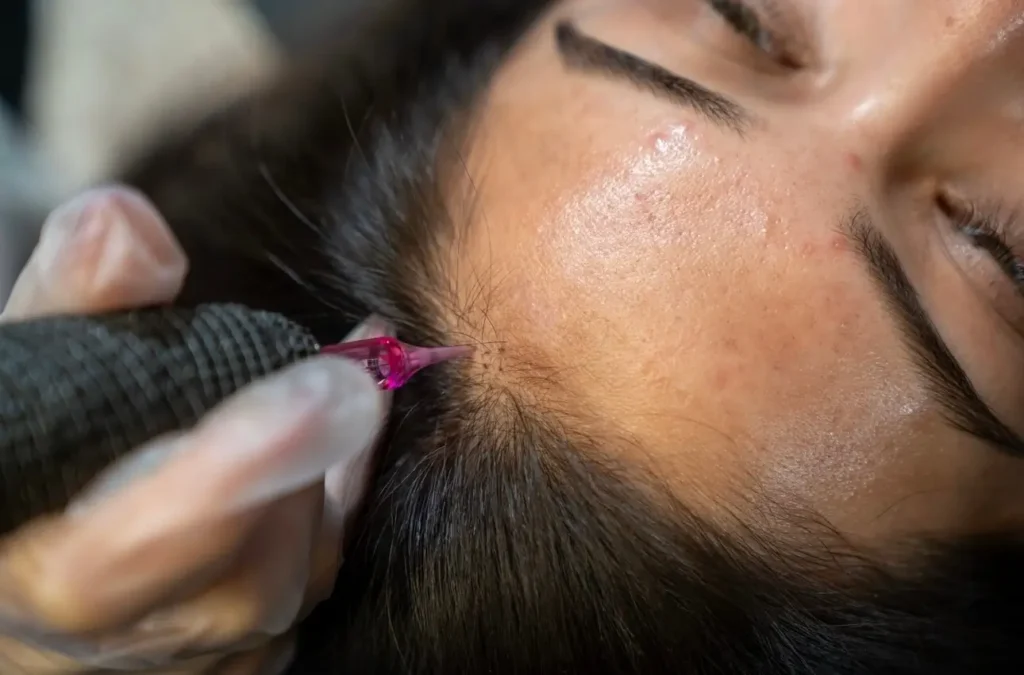Stem cell therapy is rapidly emerging as a promising solution for treating hair loss, offering a regenerative, non-surgical alternative to hair transplants and pharmaceuticals. But like any medical procedure, individual results can vary—especially based on your overall health.
Certain medical conditions can impact the effectiveness of stem cell hair regrowth treatments, slowing results or even rendering the treatment less effective. Understanding how these conditions influence outcomes is key to setting realistic expectations and determining whether you’re a good candidate.
In this article, we break down the top health conditions that may affect stem cell hair regrowth results, why they matter, and how you can optimize your treatment plan.
🧠 Why Your Health Matters in Hair Restoration
Stem cell therapy works by injecting or applying regenerative cells—often derived from fat, bone marrow, or umbilical tissue—into the scalp. These cells:
- Stimulate hair follicle regeneration
- Reduce inflammation
- Promote blood circulation
- Help restart the hair growth cycle
However, this biological process can be inhibited by underlying health conditions that affect immune function, circulation, hormone balance, or cellular repair.
⚠️ Top Medical Conditions That May Interfere With Stem Cell Hair Regrowth
1. Autoimmune Disorders
Examples: Alopecia areata, lupus, rheumatoid arthritis, Hashimoto’s thyroiditis
How they affect treatment:
Autoimmune diseases can cause the immune system to attack hair follicles, preventing them from responding to regenerative therapy. Even if follicles are reactivated, they may be damaged again unless the autoimmune response is controlled.
Tip: Stem cell therapy may still help modulate inflammation, but pairing it with autoimmune management is critical.
2. Diabetes (Type 1 and Type 2)
How it affects treatment:
High blood sugar levels impair wound healing, blood circulation, and cellular regeneration—all of which are essential for effective stem cell therapy. Additionally, diabetic scalp tissue may have reduced oxygen and nutrient supply.
Tip: Patients with well-controlled diabetes tend to respond better than those with uncontrolled blood glucose levels.
3. Thyroid Disorders
Examples: Hypothyroidism, hyperthyroidism, Hashimoto’s
How it affects treatment:
Thyroid hormones regulate hair growth cycles, and imbalances can lead to thinning, dryness, and hair shedding. Even with stem cell stimulation, follicles may struggle to enter the anagen (growth) phase if the hormonal environment is unstable.
Tip: Stabilize thyroid levels through medication or dietary changes before starting treatment.
4. Anemia or Iron Deficiency
How it affects treatment:
Iron is vital for oxygen delivery to the scalp and hair follicles. Without adequate iron or hemoglobin levels, follicles may remain in a dormant state despite regenerative stimulation.
Tip: A blood test before treatment can help detect and correct iron deficiency anemia.
5. Scalp Infections or Chronic Inflammation
Examples: Seborrheic dermatitis, psoriasis, folliculitis
How it affects treatment:
Inflammation and infection damage hair follicles and may reduce the skin’s ability to absorb stem cells. An inflamed or infected scalp environment makes it harder for stem cells to take effect.
Tip: Treat scalp conditions prior to undergoing stem cell therapy to create a receptive healing environment.
6. Androgenic Alopecia with Advanced Follicle Miniaturization
How it affects treatment:
In late-stage male or female pattern baldness, hair follicles may become irreversibly miniaturized or destroyed. Stem cell therapy may not be able to revive follicles that are completely inactive or fibrosed.
Tip: Earlier intervention yields better results. Patients with moderate thinning usually respond more favorably.
7. Poor Circulation or Vascular Disease
How it affects treatment:
Healthy circulation is essential for delivering oxygen and nutrients to the scalp. Conditions such as peripheral artery disease (PAD) or even chronic smoking may impair blood flow, reducing the efficacy of stem cell delivery and absorption.
Tip: Incorporate lifestyle changes or medications to improve circulation before and during treatment.
8. Hormonal Imbalances (Non-Thyroid)
Examples: PCOS, menopause, adrenal disorders
How it affects treatment:
Hormonal imbalances can disrupt the normal hair cycle and promote excessive shedding or thinning. Elevated androgens (DHT) in PCOS or menopause-related estrogen decline can counteract stem cell stimulation.
Tip: Address underlying hormonal issues with a hormone specialist to improve stem cell therapy outcomes.
9. Nutritional Deficiencies
Examples: Vitamin D, biotin, zinc, essential fatty acids
How it affects treatment:
Nutrient deficiencies affect cellular metabolism, keratin production, and follicle strength. Even with stem cell activation, the body may lack the building blocks for strong, sustained hair growth.
Tip: Run a nutritional panel before starting therapy and consider supplementation as part of your treatment plan.
10. Smoking and Alcohol Abuse
How it affects treatment:
Nicotine and alcohol impair wound healing, decrease circulation, and increase oxidative stress—all of which diminish the effects of regenerative treatments.
Tip: Reducing or quitting smoking/alcohol significantly boosts response rates to stem cell therapies.
📋 Pre-Treatment Checklist: Are You Ready for Stem Cell Hair Regrowth?
Before starting, your provider may recommend:
- Blood tests (hormone levels, nutrient deficiencies, autoimmune markers)
- Scalp assessment (to check for inflammation or fibrosis)
- Medical history review (to identify chronic conditions)
- Lifestyle modifications (diet, supplements, stress reduction)
A customized treatment plan ensures better outcomes and reduces the risk of poor response.
🧬 Can Stem Cell Therapy Still Work with These Conditions?
Yes—but only if the underlying medical issues are addressed first. Stem cell therapy is not a miracle cure. It’s a biologically driven process that depends on your body’s ability to heal, regenerate, and maintain follicle health.
In many cases:
- Treating thyroid or hormone imbalances boosts responsiveness
- Managing autoimmune conditions with anti-inflammatory support helps reduce recurrence
- Improving nutrition and blood flow enhances stem cell delivery and uptake
🙌 Final Thoughts
Stem cell therapy holds incredible promise for hair restoration—but it works best when your overall health supports regeneration. By understanding the medical conditions that could interfere with results, you can take proactive steps to optimize your body’s healing capacity and maximize the benefits of treatment.
Always work with a qualified provider who evaluates your medical history, lab work, and lifestyle factors before creating a personalized plan for stem cell hair restoration.




